小学英语情态动词知识点与练习题
小学英语情态动词知识点归纳 含解析

小学英语情态动词知识点归纳含解析一、选择题1.It’s amazing that the pen ________turn voice into text with few mistakes.A.can B.must C.may D.need2.Don’t cross the road until the traffic lights turn green. A car_______hit you.A.need B.may C.should D.must3.You ________ be careful with the camera. It costs!A.can B.will C.should D.may4.—Do we have to finish this today?—Yes, you ________ . Today is the last day.A.would B.may C.can D.must 5.Sorry, smoking is not allowed here. If you ________ , you will be fined according to the rules. A.can B.will C.may D.must 6.—There is a knock at the door.—It ________ be my mom. She always comes back home at this time.A.may B.may not C.must D.can’t7.—Will my car be ready by the end of the day?—It ________ be, sir. I’ll call if there’s a ny problem.A.must B.could C.shall D.should 8.—Dad, must we wait until the light becomes green?—Yes, I am afraid we ________. That’s the traffic rule.A.may B.can C.have to D.need9.— Is Lang Lang going to perform at Art Center this Friday?— Yes. It ________ be him. He has been here for three days.A.might B.must C.mustn’t D.may10.You'd better __________ hard from now on, __________ you will fail the exam. A.work; and B.working; or C.working; and D.work; or 11.—Where is Tom? I am considering ________ him about the result of the exam.—Oh. You ________. He has known it already.A.to tell; can't B.telling; needn't C.tell; mustn't D.told; shouldn't 12.—I don’t care what people think.—Well, you _______ . Some opinions are worth weighing.A.should B.might C.could D.would13.A lot of online resources ________ be used either by teachers at school or parents at home. A.can B.should C.need D.must14.— What do you think of the show yesterday?— Some of them were really good but others ________ be better.A.will B.must C.need D.can15.If you buy your mum an iRobot floor cleaner, she ________ sweep the floor every day. A.can’t B.mustn’t C.needn’t D.shouldn’t16.— Zoe, what do you think is the greatest advantage of shopping online?— At least I ______ spend much time going from shop to shop.A.shouldn’t B.can’t C.needn’t D.mustn’t 17.—Have you decided to take up teaching as career after graduation?—I ________ go abroad for further education instead. But it depends.A.must B.should C.may D.shall18.—The high school entrance examination is coming!—Yes, our teacher tells us we _______ be too careful while taking exams.A.mustn't B.shouldn't C.needn't D.can't19.We’ve discussed every detail of this plan and have got everything ready. But still something __________ go wrong. We still have to be very careful.A.must B.should C.would D.may20.You ______ pay too much attention to your pronunciation, as it is so important in the oral (口头的) test.A.shouldn’t B.mustn’t C.can’t D.needn’t 21.—Would you please________in that way? Th at’s not safe!—Sorry. I won’t do it any more.A.not driving B.not to drive C.no driving D.not drive 22.—Ready? Let’s get started, Martin.— Swimming? I just ________ get used to it in winter.A.can’t B.needn’t C.mustn’t D.shouldn’t 23.Dr. Zhong Nanshan once said, "To prevent the spread of this disease, we________never be too careful."A.can B.may C.must D.should 24.—Will your mother be at home this Saturday?—Hard to say. She _______go to the countryside to see my grandparents.A.must B.may C.can D.would25.I ________ hear you clearly. Would you please repeat it?A.mustn’t B.can’t C.needn’t D.shouldn’t 26.—Is it usually warm in Yancheng in May?—Yes. But it _______ be rather cold sometimes.A.must B.should C.would D.can 27.—Could I join you in the programme?—Sorry, you ________. You are too young.A.shouldn’t B.mustn’t C.can’t D.needn’t 28.— Excuse me, could you tell me where the Nanjing Brocade Museum is?—Go along this road for five minutes. You ________ miss it. It’s a huge building.A.mustn’t B.can’t C.needn’t D.shouldn’t 29.—Must the children leave at six tomorrow morning?—No, they _______. They can have more time to get ready for the trip.A.can’t B.needn’t C.mustn’t D.may not 30.—Mum, why do I have to wear a mask before entering the supermarket?—For your health and safety, you ________ be too careful.A.shouldn’t B.can’t C.mustn’t D.needn’t31.A hard-working man ________ become a great scientist, but a great scientist ________ be a hard-working man.A.can’t; can B.may not; must C.can’t; must D.may not; can 32.—Must I finish all my homework today, Mum?—No, you ________, my dear. You can finish some tomorrow if you like.A.needn’t B.shouldn’t C.can’t D.mustn’t33.We've discussed every detail of this plan and have got everything ready. But still something ________ go wrong. We still have to be very careful.A.must B.should C.would D.may34.—Suzy described every detail of the accident just now.—Her memory ________ be completely back.A.shall B.need C.must D.could35.Most young people like shopping online because they ________ spend much time going from shop to shop.A.needn’t B.can’t C.mustn’t D.shouldn’t 36.— Mum, why do I have to wash hands so many times a day?—You ________ be too careful, for your health.A.can’t B.mustn’t C.may not D.needn’t37.You ________ drive after drinking alcohol(酒). It’s against the law.A.mustn’t B.needn’t C.couldn’t D.wouldn’t 38.—In China, many parents complain that their children have to stay up late to do the homework.—Don’t worry. The government has realized the problem. I’m sure there ________ be good news soon.A.can B.should C.need D.must39.—Is it really necessary for me to go shopping with a mask on?—I’m afraid you ________ in public. It is not only to protect yourself but also to protect others. A.must B.should C.can D.need40.When people are waiting at the zebra crossing, cars and buses ________ wait and let them go first.A.must B.may C.can D.need 41.—Shall I tell him the change of the time right now?—I’m afraid you ________, otherwise he will be late for the meeting.A.can B.may C.must D.need42.—Will dad arrive home at 6 o’clock to have dinner with us this evening?— I think he will, but he ________ not. Sometimes he works extra hours.A.can B.must C.need D.may43.—Must we stop the Japanese government discharging nuclear waste water (排放核污水) into the Pacific Ocean?—________. Because everyone should protect our earth and it is bad ________ us to eat the polluted seafood and drink the waste water.A.Yes, we can; of B.No, we mustn’t; of C.Yes, we must; for D.No, we needn’t; for 44.Look at the floor, Tom! ________ you watch TV while having a meal?A.Should B.Could C.Must D.May45.Mr. Black ________ be at home now. He went abroad on vacation last Friday.A.can’t B.mustn’t C.needn’t D.shouldn’t 46.— The sandstorm in Beijing is so serious this year.— Yes, I wonder when we ________ worry about the air we breathe.A.can’t B.mustn’t C.needn’t D.shouldn’t 47.For the safety of the passengers, objects like guns ________ be carried on board.A.may not B.needn’t C.might not D.mustn’t 48.—How beautiful the winter jasmines (迎春花) are!—Yes. These golden-yellow flowers ________ be widely seen in my city in March.A.must B.can C.would D.should 49.—Mum, I bought some strawberries on my way home.—Oh, you’re so sweet. But the straw berries ________ be put into the fridge for freshness. A.must B.can C.may D.need50.—Will Jim come to Yangzhou for a holiday?—He ________come and it depends on how much homework he will have.A.may B.should C.must D.need【参考答案】***试卷处理标记,请不要删除一、选择题1.A解析:A【详解】句意:神奇的是,这支笔能把声音转换成文字,而且很少出错。
五年级英语情态动词练习40题
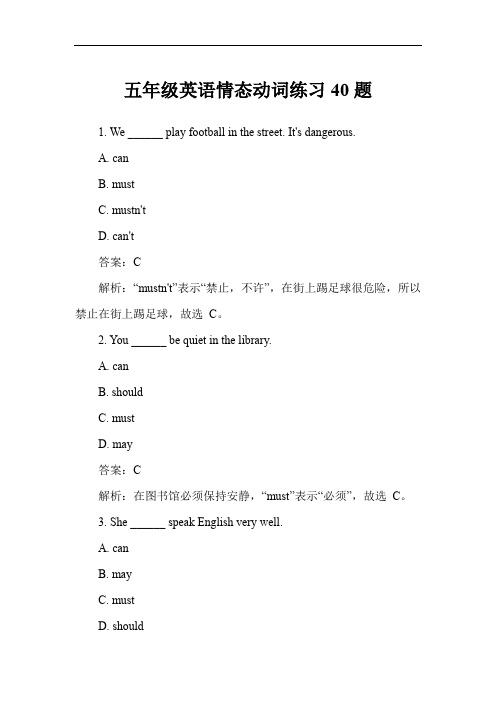
五年级英语情态动词练习40题1. We ______ play football in the street. It's dangerous.A. canB. mustC. mustn'tD. can't答案:C解析:“mustn't”表示“禁止,不许”,在街上踢足球很危险,所以禁止在街上踢足球,故选C。
2. You ______ be quiet in the library.A. canB. shouldC. mustD. may答案:C解析:在图书馆必须保持安静,“must”表示“必须”,故选C。
3. She ______ speak English very well.A. canB. mayC. mustD. should答案:A解析:“can”表示“能够”,她能够把英语说得很好,故选A。
4. We ______ listen to the teacher carefully in class.A. canB. mustC. mayD. should答案:B解析:在课堂上我们必须认真听老师讲课,“must”有“必须”的意思,故选B。
5. They ______ finish their homework on time.A. canB. mustC. mayD. should答案:B解析:“must”表示“必须”,他们必须按时完成作业,故选B。
6. We ______ play football yesterday because it rained. ()A. couldB. couldn'tC. canD. can't答案:B解析:yesterday 表明是一般过去时,根据“because it rained”可知因为下雨不能踢足球,could 是can 的过去式,couldn't 表示“不能”,故选B。
7. She ______ swim when she was five years old. ()A. couldB. canC. couldn'tD. can't答案:A解析:“when she was five years old”是一般过去时,could 表示过去的能力“能,会”,故选A。
小学情态动词练习题
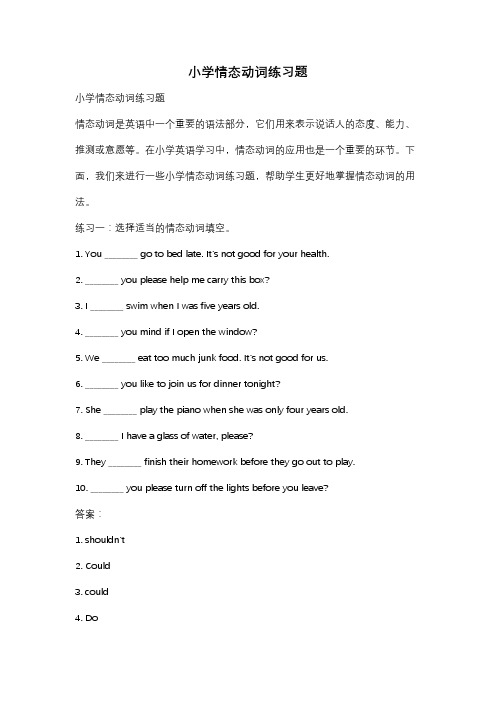
小学情态动词练习题小学情态动词练习题情态动词是英语中一个重要的语法部分,它们用来表示说话人的态度、能力、推测或意愿等。
在小学英语学习中,情态动词的应用也是一个重要的环节。
下面,我们来进行一些小学情态动词练习题,帮助学生更好地掌握情态动词的用法。
练习一:选择适当的情态动词填空。
1. You ________ go to bed late. It's not good for your health.2. ________ you please help me carry this box?3. I ________ swim when I was five years old.4. ________ you mind if I open the window?5. We ________ eat too much junk food. It's not good for us.6. ________ you like to join us for dinner tonight?7. She ________ play the piano when she was only four years old.8. ________ I have a glass of water, please?9. They ________ finish their homework before they go out to play.10. ________ you please turn off the lights before you leave?答案:1. shouldn't2. Could3. could4. Do5. shouldn't6. Would7. could8. May9. must10. Would练习二:用适当的情态动词完成下列句子。
1. I ___________ swim when I was three years old.2. _________ I have a piece of cake, please?3. She __________ speak three languages fluently.4. We ___________ go to the park tomorrow if it doesn't rain.5. _________ you please pass me the salt?6. They ____________ finish their homework before they watch TV.7. He ____________ play the guitar when he was only six years old.8. You ___________ turn off the TV before you go to bed.9. _________ I use your phone for a minute?10. They ___________ be tired after such a long journey.答案:1. could2. May3. can4. can5. Could6. must7. could8. should9. May10. must练习三:根据所给情景,选择适当的情态动词填空。
三年级英语情态动词基础单选题40题
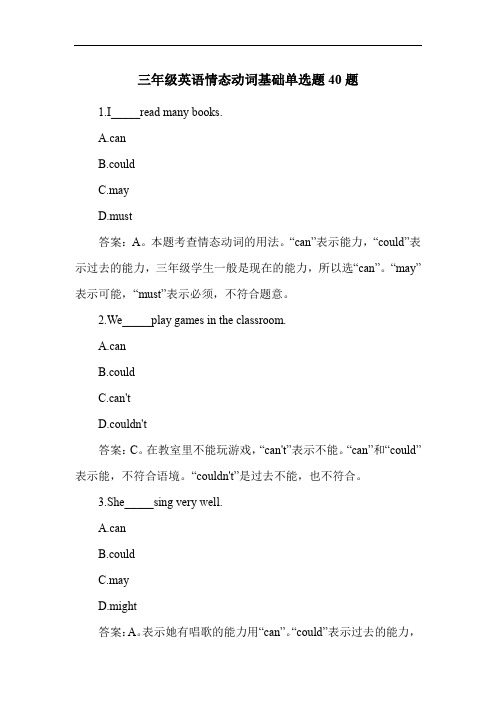
三年级英语情态动词基础单选题40题1.I_____read many books.A.canB.couldC.mayD.must答案:A。
本题考查情态动词的用法。
“can”表示能力,“could”表示过去的能力,三年级学生一般是现在的能力,所以选“can”。
“may”表示可能,“must”表示必须,不符合题意。
2.We_____play games in the classroom.A.canB.couldC.can'tD.couldn't答案:C。
在教室里不能玩游戏,“can't”表示不能。
“can”和“could”表示能,不符合语境。
“couldn't”是过去不能,也不符合。
3.She_____sing very well.A.canB.couldC.mayD.might答案:A。
表示她有唱歌的能力用“can”。
“could”表示过去的能力,“may”和“might”表示可能,不符合题意。
4.They_____draw pictures in art class.A.canB.couldC.mustD.should答案:A。
在美术课上能画画用“can”表示能力。
“could”过去的能力,“must”必须,“should”应该,都不符合。
5.I_____help you with your homework.A.canB.couldC.mayD.might答案:A。
表示我有帮助你做作业的能力用“can”。
“could”过去的能力,“may”和“might”表示可能,不符合。
6.We_____listen to the teacher carefully.A.canB.couldC.mustD.should答案:C。
在学校里必须认真听老师讲课,用“must”。
“can”和“could”表示能力,“should”应该,都不符合。
7.She_____speak English and Chinese.A.canB.couldC.mayD.might答案:A。
小学情态动词的句型转换讲解及练习

小学情态动词的句型转换讲解及练习情态动词是英语语法中的一个重要组成部分,是文章中用于表达推测、猜测、建议等含义的动词。
小学阶段是英语语言研究的重要时期,因此了解情态动词的正确使用十分必要。
什么是情态动词情态动词是一种助动词,常常用于表示某种能力、必要性、愿望、推测等情况。
动词本身表示的是动作或状态,而情态动词则表示说话人的态度或语气。
常见的情态动词有:- can- could- may- might- must- shall- should- will- would情态动词的句型转换在句子中,情态动词的位置可以变化,因此我们可以利用这一点来进行句型的转换。
以下是一些常见的情态动词句型转换:1. 直述句→ 疑问句直述句:They can swim.疑问句:Can they swim?2. 直述句→ 否定句直述句:He should finish his homework.否定句:He should not finish his homework.3. 直述句→ 疑问句+否定句直述句:You may eat the cake.疑问句+否定句:May you not eat the cake?现在我们来做一些练,更好地掌握情态动词的句型转换。
练题1. 直述句:They can play the guitar.疑问句:否定句:2. 直述句:She should go to bed early.疑问句+否定句:3. 直述句:I will finish my homework tomorrow.否定句:疑问句+否定句:练答案1. 直述句:They can play the guitar.疑问句:Can they play the guitar?否定句:They cannot play the guitar.2. 直述句:She should go to bed early.疑问句+否定句:Shouldn't she go to bed early?3. 直述句:I will finish my homework tomorrow.否定句:I will not finish my homework tomorrow.疑问句+否定句:Won't I finish my homework tomorrow?以上是小学情态动词的句型转换讲解及练习,希望能对您有所帮助。
小学英语情态动词练习题及答案

小学(完整版)英语情态动词练习题及答案一、选择题1. If you buy your mum an iRobot floor cleaner, she sweep the floor every day.A.can'tB.mustn'tC.needn'tD.shouldn'tTo my joy, we go to the bank. Mary has lent us some money.A.shouldn'tB.needn'tC.couldn'tD.wouldn't —There is a knock at the door.We shouldn't throw any objects from the building. Even a small object cause serious injuries or death, when dropped from a great height. A.mustB.shouldC.mayD.needOur Chemistry teacher always tells us we be too hardworking before the exams. A.mustn'tB.shouldn'tC.needn'tD.can't —Dad, must we wait until the light becomes green? —Yes, I am afraid we. That's the traffic rule.A. mayB. canC. have toD. need —you give me a hand? I can't put up the poster by myself.—No problem.A. CouldB. ShouldC. NeedD. Must —Where is Tom? I am considering him about the result of the exam. —Oh. You, He has known it already.A. to tell; can'tB. telling; needn'tC. tell; mustn'tD. told; shouldn't 11. When you visit a museum, some instructions should and we'd better notthem.A. pay attention to; be againstB. be paid attention; againstC. be paid attention to; againstD. be paid attention to; be against12. —Do we have to finish this today?—Yes, you. Today is the last day.A,wouldB.mayC,canD.mustIts amazing that the pen turn voice into text with few mistakes.A.canB.mustC.mayD.needWe teenagers have dreams. With dreams and hard work, anything amazingbe created.【详解】句意:一一听!汤姆一定是一边做作业一边听音乐。
(完整版)小学英语情态动词知识点及练习

情态动词【知识要点】:情态动词(Modal verbs)本身有一定的词义,表示语气的单词。
但是不能独立作谓语,只能和动词原形一起构成谓语。
情态动词用在行为动词前,表示说话人对这一动作或状态的看法或主观设想。
情态动词虽然数量不多,但用途广泛,主要有下列: can (could), may (might), must, need, ought to, dare (dared), shall (should), will (would) must not.情态动词无人称和数的变化,情态动词后面跟的动词须用原形,否定式构成是在情态动词后面加 "not"。
疑问形式是将情态动词提至主语前。
个别情态动词有现在式和过去式两种形式,过去式用来表达更加客气,委婉的语气,时态性不强,可用于过去,现在或将来。
情态动词属非及物动词,故没有被动语态。
【典型例题】:【专题一】:can和could的用法【例1】Can you lift this heavy box?(体力)【解析】表示能力(体力、知识、技能)【练习】1.Mary speak three languages.(知识)2. you skate?(技能)此时可用be able to代替。
Can只有一般现在时和一般过去式;而be able to 则有更多的时态。
I’ll not be able to come this afternoon.当表示“经过努力才得以做成功某事”时应用be able to,不能用Can。
【例2】-----Can I go now?----- Yes, you can. / No, you can’t.【解析】表示请求和允许。
此时可与may互换。
在疑问句中还可用could,might 代替,不是过去式,只是语气更委婉,不能用于肯定句和答语中。
【练习】---- I come to see you tomorrow?---- Yes, you .----No, you /I’m afraid not.【例3】Can this be true?【解析】表示推测(惊讶、怀疑、不相信的态度),用于疑问句、否定句和感叹句中。
情态动词测试题及答案
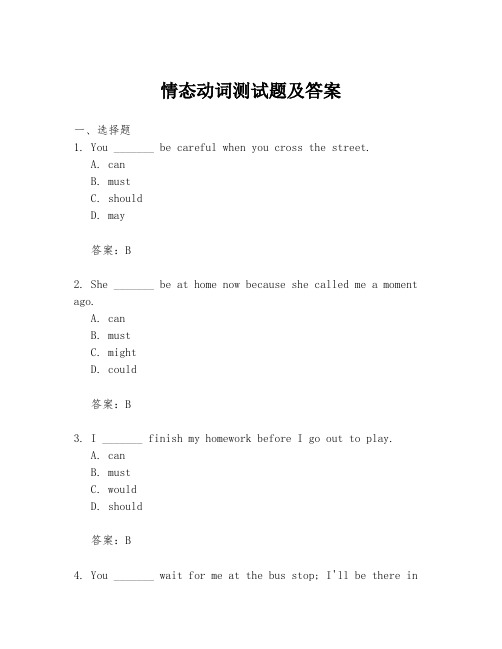
情态动词测试题及答案一、选择题1. You _______ be careful when you cross the street.A. canB. mustC. shouldD. may答案:B2. She _______ be at home now because she called me a moment ago.A. canB. mustC. mightD. could答案:B3. I _______ finish my homework before I go out to play.A. canB. mustC. wouldD. should答案:B4. You _______ wait for me at the bus stop; I'll be there infive minutes.A. needB. mustC. canD. may答案:C5. They _______ have finished their work by now.A. canB. mustC. shouldD. might答案:C二、填空题6. It’s cold outside. You _______ wear a coat.答案:should7. The doorbell rang, _______ it be the postman?答案:could8. _______ you tell me the way to the library?答案:Could9. I _______ go to the party, but I have to finish my report first.A. canB. mustC. wouldD. should答案:C10. _______ I borrow your pen for a moment?答案:May三、改错题11. He can go to the concert, but he must to stay at home.错误:to stay正确:must stay12. She might have finished her work, but I think she should be working now.错误:might have finished正确:may have finished13. You should to call your parents before you leave.错误:to call正确:should call14. I would like to go to the beach, but I can’t afford it.错误:would like正确:could15. They must have been at the meeting, but they were actually at the cinema.错误:must have been正确:could have been四、翻译题16. 他可能已经完成了他的作业。
(完整版)情态动词专项练习(含答案)
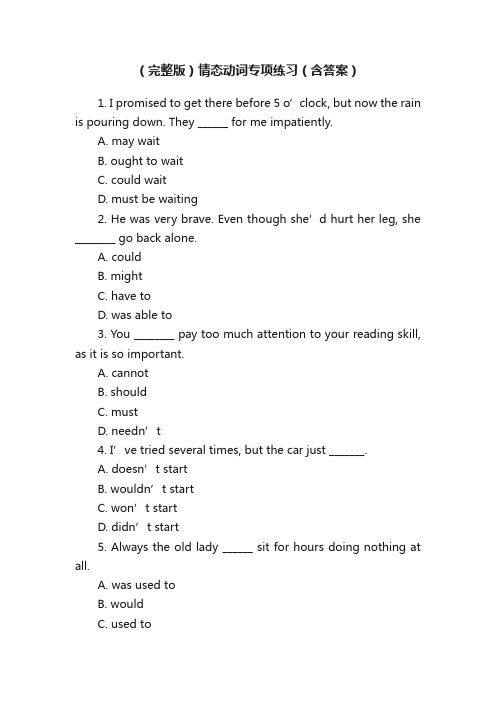
(完整版)情态动词专项练习(含答案)1. I promised to get there before 5 o’clock, but now the rain is pouring down. They ______ for me impatiently.A. may waitB. ought to waitC. could waitD. must be waiting2. He was very brave. Even though she’d hurt her leg, she ________ go back alone.A. couldB. mightC. have toD. was able to3. You ________ pay too much attention to your reading skill, as it is so important.A. cannotB. shouldC. mustD. needn’t4. I’ve tried several times, but the car just _______.A. doesn’t startB. wouldn’t startC. won’t startD. didn’t start5. Always the old lady ______ sit for hours doing nothing at all.A. was used toB. wouldC. used toD. should6. There used to be a small school,___________?A. was thereB. wasn’t itC. usedn’t thereD. usedn’t it7. Our house is on the top of the hill, so in summer the wind _____ be pretty cold.A. mustB. canC. ought toD. need8. Haven’t I told you that you __________ have the ans wer tomorrow morning?A. willB. shallC. shouldD. would9. I’m surprised that he _______ in the match.A. should failB. should have failedC. would have failedD. may have failed10. Better go to see my sick colleague right now, ________I?A. hadn’tB. didn’tC. don’tD. won’t11. Sir, you ______ be hunting deer here, for they are preserved by the government.A. oughtn’t toB. can’tC. won’tD. needn’t12. Sorry I’m late. I ______ have turned off the alarm clock and gone back to sleep again.A. mightB. shouldC. canD. will13. —There were already five people in the car, but they managed to take me as well.— It __________ a comfortable journey.A. can’tB. shouldn’t beC. must have beenD. couldn’t have been14. To be on the safe side, we should fill up the tank now, because we ______ run out of gas on the way.A. canB. wouldC. mightD. should15. ____ three people who travel together, there _____ be at least one who ____ be my teacher.A. Between; can; willB. In; should; couldC. Among; will; mayD. Of; must; can16. —Could you lend me that book you ______ me aboutwhen I telephoned you?—No, I am sorry, I can’t. I gave it to a friend.A. were tellingB. would tellC. had toldD. had been telling17. —We need a person badly to think up such an idea.—_______ the new comer have a try?A. ShallB. MayC. ShouldD. Need18. We ________ so tired. We’ve only been to a party.A. mustn’t have feltB. wouldn’t have feltC. shouldn’t have feltD. couldn’t have felt19. Professor Smith, many students want to see you. __________ they wait here or outside?A. DoB. ShallC. WillD. Would20. —How about paying a visit to Mr. Richardson, our former history teacher?—Good idea. I will e-mail him today so he _____know _________ to expect us.A. shall; whyB. may; whenC. would; whyD. will; how21. —I went to work on foot yesterday, though it _________ cats and dogs.—You __________ by bus. It was likely to get a cold.A. is raining; must have goneB. rained; would goC. was mining; should have goneD. have rained; could have gone22. You ______ pay too much attention to your reading skill, as it is so important.A. cannotB. shouldC. mustD. needn’t23. I told Sally to fix him up with this job, but perhaps I _________ it out for her.A. had to writeB. must have writtenC. should have writtenD. ought to write24. My sister met him at the Grand Theatre yesterday afternoon, so he ________ your lecture.A. couldn’t have attendedB. needn’t have attendedC. mustn’t have attendedD. shouldn’t have attended25. Research findings show we spend about two hours dreaming every night, no matter what we ________ during the day.A. should have doneB. would have doneC. may have doneD. must have done26. —Is there any flight to Tokyo today?— I think there _____, for the weather is too bad.A. mustn’t beB. mightn’t beC. needn’t beD. can’t be27. —I’m told that John had another car accident this morning.— I believe not. He _____ so careless.A. shouldn’t have beenB. wouldn’t have beenC. couldn’t have beenD. mustn’t have be en28. It was playing computer games that cost the boy a lot of time that he __________ doing his lessons.A. might have spentB. ought to have spentC. must have spentD. could have spent29. —I didn’t know you were good friends.—You _______. I have known her since she moved here. You were studying abroad then.A. may haveB. needn’t haveC. couldn’t haveD. must have30. They must have finished the work by the end of last month, __________?A. mustn’t theyB. haven’t theyC. hadn’t theyD. didn’t they31. —I didn’t see her yesterday.— Of course, you _____, because he had gone for a trip.A. can’tB. may not haveC. can’t haveD. mustn’t have32. You ________ phone him if you want to, but you _________. He is sure to phone you.A. may; mustn’tB. have t o; needn’tC. can; doesn’t needD. can; needn’t33. — She must have gone back to the valley.— ______, she _____ have. The entrance to it was nowhere to be found.A. No; mustn’tB. Yes; mightC. Yes; couldD. No; couldn’t34. He _____ full marks, but he was so careless as to make a spelling mistake.A. must have gainedB. can have gainedC. could have gainedD. must gain35. From what you said, she _____ you about it.A. mustn’t have toldB. can’t have toldC. mustn’t tellD. can’t tell36. — You ought to have made an apology to Tom yesterday evening.— Yes, I know I _________.A. ought toB. have toC. should haveD. must have37. —Is there a fog in the evening?—There _______ be. I’ll make a phone call to find it out.A. mustB. wouldC. willD. might38. — _______ he help you with the problem?—Well, though it is very hard, __________ I’ll do what I can to work it out.A. Shall; butB. Can; andC. Must; howeverD. Will; still39. —How is that, Joan?—Yeah, it’s from the boss. She _________ first, whether she likes it.A. shall goB. ought to have goneC. should goD. must have gone40. —Would you like to watch the video, in which you can see foreigners making jiaoji during the Spring Festival?—Sure, it ______ be very interesting.A. shouldB. mayC. canD. will41. —The door was open.—It _________ open. I had locked it myself and the key was in my pocket.A. can not beB. must not beC. can not have beenD. must not have been42. —Where ________ Margaret have put the empty bottles?—She ________ them away. They must be somewhere.A. can; can’t have thrownB. must; needn’tC. must; must have thrownD. cant; must throw43. —Mum, I climbed to get the Teddy Bear from the top of the shelf.—My goodness! You _______ yourself. You ______ do that next time.A. mu st have hurt; mustn’tB. should have hurt; can’tC. may have hurt; mustn’tD. might have hurt; won’t be able to44. —Shall I go and buy more food and drinks for the party?—No, we have prepared a fridge of those. That _______ be quite enough.A. canB. mayC. mightD. ought to45. —Hurry up, Michael! It’s ten to three.—Goodness me! The class_______. I’ll be late again.A. must beginB. may beginC. should have begunD. must have begun46. When he was there, he ____ go to that coffee shop at the street comer after work every day.A. wouldB. shouldC. had betterD. might47. —I hear you have written a novel.—Yes, the book ________ be out in a month or so.A. canB. dareC. shouldD. need48. —How could I thank you enough?—Don’t mention it. Any other man _________ that.A. must doB. could doC. would have doneD. should have done49. —Why aren’t they here yet?—They ________ the bus.A. can have missedB. must be late forC. may have missedD. might be late for50. Mike _______ come to see me I don’t want to go out in case he comes.A. canB. mustC. mayD. will51. The thief ________ in from the kitchen window as the door was closed.A. may climbB. must have climbedC. could have climbedD. should have climbed52. —You didn’t invite Bill?— __________ him too?A. Must I inviteB. Must I have invitedC. Should I inviteD. Should I have invited53. —Why didn’t you attend the lecture yesterday?—I didn’t think that we _______ on Sundays.A. shouldB. ought to haveC. shouldn’t haveD. will have to54. It’s said that there are plenty of hotels in that town. There ______ be any difficulty for you to find somewhere to stay.A. wouldn’tB. mustn’tC. shouldn’tD. needn’t55. —Would you be here to attend the English party this evening?—Yes, we _________.A. shallB. wouldC. willD. must56. On Sundays when I was a child, Father and I _______ get up early and go fishing.A. couldB. wouldC. mightD. should57. —You’d better keep quiet in class.—Sometimes I ________ Yesterday, I was very quiet during my English class.A. wouldB. doC. didD. have58. I lived with my sister this summer and didn’t have to pay rent. So I ______ save most of my salary.A. couldB. wouldC. was able toD. should59. —Look, John’s fallen asleep.— Oh, he _______ too late last night.A. might sit upB. should have sat upC. could sit upD. must have sat up60. —I posted the letter a week ago.—Then they __________ the letter by now. It usually takes four days.A. can have receivedB. must receiveC. should receiveD. ought to have received61. He used to teach in that university and I _________ ride past it on my way to work.A. wouldB. couldC. shouldD. might62. —So you have to leave now.—Yes, I __________.—How nice it would be if you could stay a bit longer!A. have toB. ought toC. doD. have63. He _______ Shanghai, for I saw him talking with the headmaster a moment ago.A. must have gone toB. can’t have gone toC. mustn’t have been toD. can’t have been to64. From what I learn about their hotel, the service and the weather, they _____ their holiday very much.A. wouldn’t have enjoyedB. shouldn’t have enjoyedC. needn’t have enjoyedD. can’t have enjoyed65. It is not like Jack to be unfriendly, so he _________ you when you called.A. can’t have seenB. should not have seenC. must not have seenD. need not have seen66. —Many people in England love to give advice on weather reporting.—Yes, but I think the weather office’s computers _________ be more accurate.A. canB. mustC. ought toD. might67. —The farmers lived near the high way.—________ very noisy.A. It must have beenB. They must beC. That might beD. There must be68. She is too slow. She ________ pass the test, but she __________ too little.A. would; knewB. will; knowsC. would; knowsD. will; knew69. —Mary didn’t turn up last time, did she?—No. She_________. We had changed our plan.A. shouldn’t have comeB. needn’t have to comeC. didn’t need to comeD. needn’t have come70. —They haven’t finished the work up to now.—Well, they________.A. shouldB. should haveC. wouldD. must have71. —Shall I go and buy more fruit for the party?—No, I have already bought 3 baskets. That _________ be enough.A. canB. ought toC. mayD. might72. —Why hasn’t the speaker turned up?—He _________ the flight. I’ll find it out at once.A. must have missedB. might have missedC. would have missedD. could have missed73. I _______ pay Tom a visit, but I am not sure whether I will have time this Sunday.A. shouldB. mightC. wouldD. could74. —Who is the girl standing over there?— Well, if you _____ know, her name is Mabel.A. mayB. canC. mustD. shall75. It has been announced that candidates (考生)________ remain in their seats until all the papers have been collected.A. canB. willC. mayD. shall【答案解析】1.D。
小学英语常考情态动词及习题练习

小学常考情态动词(can,must,should,might)及习题情态动词:情态动词本身具有一定的词义,表示说话人的某种语气或感情,但不能单独作谓语,通常要和行为动词一起构成谓语。
情态动词没有人称和数的变化,适用于所有人称,其后要接动词原形。
一、情态动词can的用法:1、其中情态动词can表能力时意为“能够做某事”,后接动词原形;否定形式为can't或cannot;can的过去式为could。
例:1.Tony can play basketball, but he can't play the piano.Tony会打篮球,但他不会弹钢琴。
2.Can Lily speak Chinese? —Lily会说中文吗?-Yes, she can. —是的,她会。
3.What can you do, Kate? —Kate,你会做什么?-I can play the violin. —我会拉小提琴。
2、其中情态动词can表许可或请求别人的许可时,意为“可以”,后接动词原形,相当于may,但may多用于正式、庄重的场合;can的否定形式为can't 或cannot。
例:You can go now if you like. 如果你想走,现在就可以走了。
-Mark, can I use your pen? —Mark,我能用下你的钢笔吗?-Of course. —当然了。
二、情态动词must表示“必须,应该,一定要”。
●∙主语是第一人称I或we时,表示说话人认为有必要或者有义务做某事;主语是第二、第三人称you、they、he、she等时,表示说话人要求或命令别人做某事。
●∙must的否定形式为must not,缩写为mustn't,意为“不许;严禁”。
●∙must引导的一般疑问句,肯定回答用must,否定回答用needn't或don'thave to,意为“不必”。
小学英语情态动词讲解和练习

Can I use your pen? Yes, here it is. Can you help me? Yes, I can.
我能用一下你的钢笔吗? 当然,给你。 你能帮帮我吗? 是的,当然。
Did you know? When you put not after can, you write it as one word: cannot. Learn these contractions: cannot= can’t Some birds cannot(can’t )fly.
2. 表示可能性时,常用在肯定句中,意为“可能,也许” He may be very busy now. 他现在可能很忙。 He said that she may not be at work today. 他说她今天也许不上班。
3. Can 和 may 都可以表示推测。can 通常用在否定句和疑问句中,may 通常用在肯定句和否定句中。 虽然两者都可以用于否定句,但是程度不同,can’t 的语气比may not 更强。
A. can B. may C. must
II. Read and write.
1. You _____c__a__n_________ (can) borrow my book, if you want. 2. They’ve lost the map and ___c__a__n___n___o__t__ (can) find their way back to the hotel. 3. May I go out to play now? No, you ___m___a___y___n__o__t________(may). 4. If you want to be healthy, you __m___u___s__t__n___o__t_____ (must) eat junk food. 5. You ___m___u___s__t__________ (must) believe yourself.
小学情态动词试题及答案

小学情态动词试题及答案一、选择题1. – May I go to the restroom?– __________.A. Yes, you mayB. No, you can'tC. Yes, you must2. – Could you please help me carry this box?– __________, I'm busy now.A. SureB. I'd love toC. Sorry3. – Must we finish our homework tonight?– No, you _________.A. needn'tB. mustn'tC. may not4. – Mike is sick today. He _________ come to the party.– That's too bad.A. mayB. willC. can't5. – Would you mind closing the window?– __________.A. Yes, I wouldB. No, I wouldn'tC. Sorry, I can't二、填空题1. We _________ stand up when the teacher comes in.2. They _________ play computer games on weekdays.3. _________ you please pass me the salt?4. Tony _________ speak English fluently.5. My sister _________ swim when she was three.三、改错题请将下面每句话中错误的单词画出并将正确的单词写在横线上。
1. We mustn't to tell anyone about our secret.2. Tom can't swimming very well, but he is practicing hard.3. Could I borrow you a pen, please?4. They will must finish the project by next week.5. May I to go to the bookstore after school?四、阅读理解请仔细阅读下面的短文,然后按照要求回答问题。
小学三年级英语情态动词can语法及习练题

【导语】正确的语法可以简化信息,简单的⼀句话就能传达很多信息,甚⾄包含多重意思,就像双关语⼀样。
语法正确还能避免歧义,明确指代关系和修饰对象等,是很有⽤的,学进去了就明⽩了。
以下是整理的相关资料,希望对您有所帮助!【情态动词can 】 can 在英语中有⼀个特殊的名字,叫做情态动词,表⽰"能够", "会", "能⼒"后⾯要跟着表⽰动作的动词。
没有时态和⼈称的变化。
表⽰不能做什么的时候,后⾯加上 not为 can not,或者缩写为can't。
问别⼈"能…吗?"要把can 放在句⼦前⾯,⾸字母要⼤写,句尾别忘加上问号。
例句:-I can swing .I can draw. -She can jump.He can play . -We can touch .They can run. -I can't sing.You can't see. -She can't dance.He can't hear a car. -We can't hear an aeroplane. -Can you hear a dog?Can he hear a bus? -Can Lucy write?Can you do it? 将下⾯各组词组成句⼦ 1.________________________(an,aeroplane,hear,Lucy,can ) 2. ____________________________ (not,he ,dance,can ) 3.____________________________? (you,can ,see,what ) 4.____________________________(can ,see ,not ,we ,you) 5._____________________________. (I ,can ,help ,you ) 6._____________________________? (I,can ,do,what) 7._____________________________? (you ,can ,hear me) 8._____________________________? (you ,can ,dance)【答案】 1. Lucy can hear an aeroplane. 2. He can not /can't dance.3. What can you see?4. We can not /can't see you5. I can help you.6. What can I do? 7. Can you hear me? 8. Can you dance?。
小学四年级英语常用语法知识点及练习

小学四年级英语常用语法知识点及练习小学四年级英语常用语法知识点及练习鉴于英语语法的重要性,为了帮助大家把语法学好,应届毕业生店铺为您提供了这篇小学四年级英语常用语法总结,希望对您的英语有所帮助。
(一)情态动词cancan 在英语中有一个特殊的名字,叫做情态动词,表示“能够”,“会”,“能力”后面要跟着表示动作的动词。
没有时态和人称的变化。
表示不能做什么的时候,后面加上not为can not,或者缩写为can’t。
问别人“能…吗?”要把can 放在句子前面,首字母要大写,句尾别忘加上问号。
例句:—I can swing.I can draw. —She can jump.He can play .—We can touch .They can run. —I can’t sing.You can’t see.—She can’t dance.He can’t hea r a car. —We can’t hear an aeroplane.—Can you hear a dog?Can he hear a bus? —Can Lucy write?Can you do it?将下面各组词组成句子1._____________(an,aeroplane,hear,Lucy,can)2. _____________________(not,he ,dance,can )3.__________________? (you,can ,see,what )4._________________(can ,see ,not ,we ,you)5._________________. (I ,can ,help ,you )6._____________________? (I,can ,do,what)7.___________________? (you ,can ,hear me)8.___________________? (you ,can ,dance)(二)人称代词所属格注意:主格作主语,其中she指带代国家,it可指代天气时间等。
小学英语小升初专题训练-词法专项练习:情态动词 50题(含答案)

小学英语小升初专题训练-词法专项练习:情态动词一、单选题(共34题;共68分)1."You ________ kill Snow White," said the queen.A. mustB. couldC. can2.We should ________ too many trees.A. stop cutting downB. stop cut downC. stopping cut down3.You shouldn't the trash in the woods after the picnic.A. leaveB. leftC. want4._________ you please give me a glass of juice?A. CanB. CouldC. May5.Shanghai is _________ a big city in China.A. mustB. reallyC. can6._________ I have some juice?A. WouldB. CanC. May7.Hello, _________ I speak to my mother?A. mayB. whyC. how8.We be quiet in the classroom.A. shouldB. shouldn'tC. can't9.When you feel angry, you should __________________ a deep breath and count to ten.A. doB. takesC. take10.What can you ______?A. doB. doesC. doing11.Hurry up! I can't _________ the balloons.A. holdB. heldC. holding12.The kite can ________ high in the sky.A. flyB. flyingC. flies13.Mike couldn't swimming before.A. goB. goesC. went14.Could you _______ stars at night?A. seeB. sawC. sea15.Can you _______ the dog's barking?A. listenB. listeningC. hear16.We should _______________ hard and _______________ healthy.A. studies; staysB. studying; stayingC. study; stay17.__________wood, we _________cut down too many trees.A. Save; shouldn'tB. To save; shouldn'tC. To save; should18._________ you please give me a pencil?A. CanB. CouldC. May19.Can you my pen friend?A. beB. to beC. being20.We should not on the grass.A. walkingB. to walkC. walk21.—_________ you like some juice?—No, thanks.A. CanB. WouldC. Could22.Trees are good for us. We _________ take good care of them.A. couldB. mayC. should23.— _________ I hand in my homework this afternoon?—No, you _________. You can hand it in tomorrow,A. Must, mustn'tB. May, can'tC. Must, needn't24.Louis ________ run, but he ________ swim in the river. He is only 5.A. can; can'tB. can't; can'tC. can; can25.He was three then. He______________ talk. He______________ swim.A. can; canB. can't; couldn'tC. could; couldn't26.You______________ be late. You______________ work hard.A. should: shouldB. should; shouldn'tC. shouldn't; should27.You______________ take the books down.A. shouldB. shouldn'tC. could angry now!28.The girl______________ walk then.A. canB. couldn'tC. can t29.Can you see the red man? You ______ cross the road now.A. mustn'tB. mustC. can30.—Who will be responsible for classroom cleaning, Jim or Nancy?—It be Jim because he is on holiday.A. needn'tB. shouldn'tC. mustn'tD. can't31.There was nothing he________ do.A. canB. couldC. coulds32.Suddenly Mocky couldn't________.A. breatheB. breathedC. breathes33.— What can she _____?— She can play ping-pong.A. doesB. doC. doesn'tD. don't34.— Can I wear my new skirt today?— Yes, you _______.A. canB. can'tC. doD. don't二、选词填空(词汇运用)(共2题;共2分)35.________ (Can/Could) I help you?36.You ________(should /shouldn't) clean your room.三、语法填空(共14题;共24分)37.Helen Keller ________ (could) hear.38.We should ________ (keep) ________ (we) city clean.39.We ________ (should) stop ________ (use) plastic bags.40.You can ________ (see) a lot of tall ________ (building).41.Please stop ________ (make) noise. I can't ________ (hear) the teacher.42.All of us should ________ (do) something ________ (save) wild animals.43.You should ________ (be) quiet in the library.44.The driver must ________ (look) at the traffic lights.45.We must ________ (listen) to our teachers in class.46.We ________ (must) play near fires.47.We ________ (must) keep our classroom clean.48.I couldn't speak English then. But I ________ (can) speak English now.49.We should ________ (take) exercise every day.50.用情态动词can,must,should,shall填空(1)At Halloween you________ give candy to the children if they come to knock at your door. (2)What________Danny do if he wants to become thin and healthy?(3)When________we go to see the film "Rabbit Run"?(4)In the Science Museum you________see robots playing the piano well.(5)We________know a lot of English words if we want learn English well.(6)________ we go to the park and fly our kites there?答案解析部分一、单选题1.【答案】A【考点】动词辨析,情态动词【解析】【分析】句意:“你……杀死白雪公主。
小学专项练习情态动词练习题及
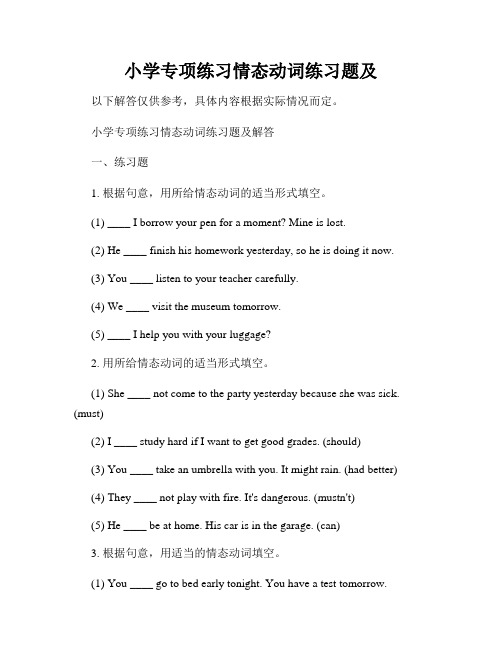
小学专项练习情态动词练习题及以下解答仅供参考,具体内容根据实际情况而定。
小学专项练习情态动词练习题及解答一、练习题1. 根据句意,用所给情态动词的适当形式填空。
(1) ____ I borrow your pen for a moment? Mine is lost.(2) He ____ finish his homework yesterday, so he is doing it now.(3) You ____ listen to your teacher carefully.(4) We ____ visit the museum tomorrow.(5) ____ I help you with your luggage?2. 用所给情态动词的适当形式填空。
(1) She ____ not come to the party yesterday because she was sick. (must)(2) I ____ study hard if I want to get good grades. (should)(3) You ____ take an umbrella with you. It might rain. (had better)(4) They ____ not play with fire. It's dangerous. (mustn't)(5) He ____ be at home. His car is in the garage. (can)3. 根据句意,用适当的情态动词填空。
(1) You ____ go to bed early tonight. You have a test tomorrow.(2) You ____ be careful when you cross the street.(3) ____ I open the window? It's a little hot.(4) The baby is sleeping. We ____ speak loudly.(5) You ____ put on warm clothes. It's cold outside.二、解答1. 根据句意,用所给情态动词的适当形式填空。
小学专项练习题情态动词练习及
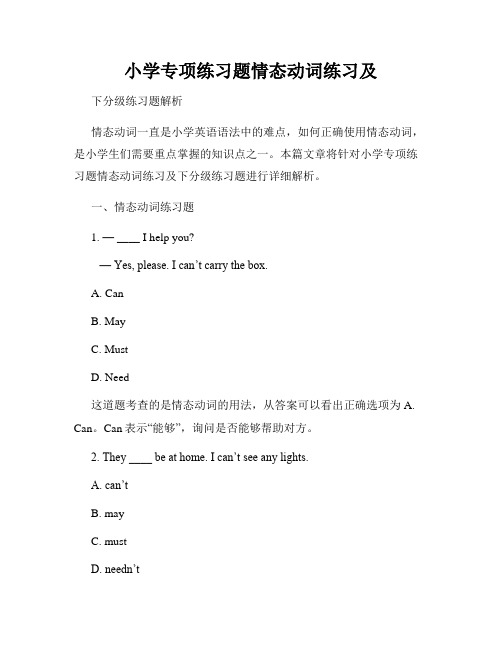
小学专项练习题情态动词练习及下分级练习题解析情态动词一直是小学英语语法中的难点,如何正确使用情态动词,是小学生们需要重点掌握的知识点之一。
本篇文章将针对小学专项练习题情态动词练习及下分级练习题进行详细解析。
一、情态动词练习题1. — ____ I help you?—Yes, please. I can’t carry the box.A. CanB. MayC. MustD. Need这道题考查的是情态动词的用法,从答案可以看出正确选项为A. Can。
Can表示“能够”,询问是否能够帮助对方。
2. They ____ be at home. I can’t see any lights.A. can’tB. mayC. mustD. needn’t这道题同样考查的是情态动词的用法,从句意可以看出正确答案为A. can’t。
Can’t表示“不能,不可能”,因为看不到任何灯光,所以推测对方不在家。
3. The old man ____ take a walk in the morning.A. canB. mayC. mustD. had to这道题同样考查的是情态动词的用法,从句意可以看出正确答案为B. may。
May表示“可能”,老人喜欢早上散步是一种可能情况。
二、下分级练习题1. Lucy’s father asked her ____ the door.A. closeB. to closeC. closingD. closed这道题考查的是动词不定式的用法,从根据语境可以知道正确答案为B. to close。
Asked后面接动词不定式表示请求、命令等。
2. _____ late again, or you will be fired.A. Don’t beB. NotC. Not to beD. Do not这道题考查的是否定的用法,根据语境可以知道正确答案为A. Don’t be。
Don’t被用于否定祈使句,表示不要做某事。
小学情态动词练习题及答案

小学情态动词练习题及答案1. Must I stand up?No, you ________.2. ________ I speak something?Yes, you ________.3. ________ I leave the park now? No, you _________ stay here.4. My grandmother is ill. I _________ stay at home and look after her.5.________ you like some juice?6. They ________ take more exercise.7. ________ you tell me the way to the museum?8. The watch ________ tell us the right time.9. ________ you like to go boating with us?10. ________ we play chess next weekend?按要求改写句子。
1.She can walk quickly.I ________ ________quickly .2. You have to finish the work now.________ I the work now? No, you ________.3. They can paint the wall well._______ they ______ the wall well?4.Tom must carry the box into the room.Tom ________ ________ carry the box into the room.5.She should reach the station early.She _______ _______ reach the station early.单项选择。
小学英语6年级英语语法专题突破 情态动词基础知识与情景对话(学生版)
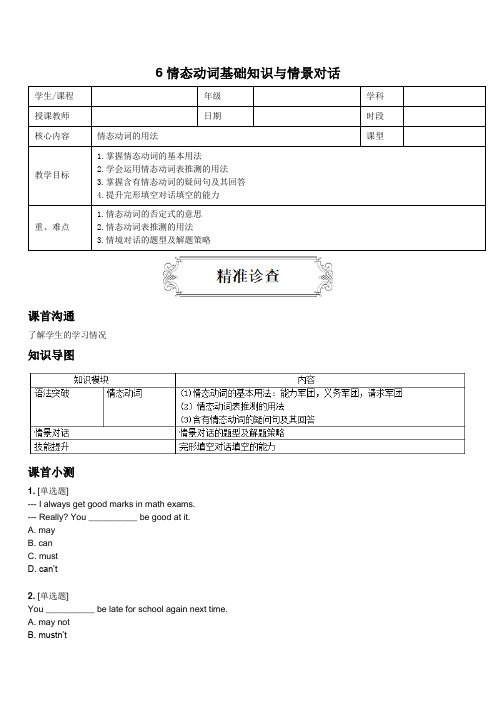
6情态动词基础知识与情景对话课首沟通了解学生的学习情况知识导图课首小测1. [单选题]--- I always get good marks in math exams.--- Really? You __________ be good at it.A. mayB. canC. mustD. can’t2. [单选题]You __________ be late for school again next time.A. may notB. mustn’tC. mayD. can3. [单选题]You __________ go to ask Mary. She __________ know the answer.A. must; canB. can; mayC. need; mayD. must; may4. [单选题]--- Jack __________ be in the classroom, I think.--- No, he __________ be in the classroom. I saw him go home a minute ago.A. can; may notB. must; may notC. may; can’tD. may; mustn’t5. [单选题]--- May I have an apple, Mum?--- Certainly. But you __________ wash your hands first.A. mayB. canC. mightD. must6. [单选题]--- Must I stay at home and take care of the baby?--- No, you __________.A. mustn’tB. needn’tC. can’tD. won’t7. [单选题]--- Must we do some cleaning now?--- No, you __________. You __________ go home.A. mustn’t; mayB. mustn’t; mustC. needn’t; mayD. can’t; can--- Can I have some more tea?--- Yes, you __________.A. canB. may notC. mayD. must9. [单选题]Jim is clever. I’m sure he __________ catch up with his classmates.A. mustB. canC. mustn’tD. can’t10. [单选题]--- __________ I smoke here?--- No, you __________.A. May; mustn’tB. Can; needn’tC. May; don’tD. Can; don’t导学一情态动词基本用法知识点讲解1:情态动词的含义表示命令、允许、请求、拒绝、愿望、愿意、义务、必要、可能、敢于、需要等的动词是情态动词。
- 1、下载文档前请自行甄别文档内容的完整性,平台不提供额外的编辑、内容补充、找答案等附加服务。
- 2、"仅部分预览"的文档,不可在线预览部分如存在完整性等问题,可反馈申请退款(可完整预览的文档不适用该条件!)。
- 3、如文档侵犯您的权益,请联系客服反馈,我们会尽快为您处理(人工客服工作时间:9:00-18:30)。
情态动词【知识要点】:情态动词(Modal verbs)本身有一定的词义,表示语气的单词。
但是不能独立作谓语,只能和动词原形一起构成谓语。
情态动词用在行为动词前,表示说话人对这一动作或状态的看法或主观设想。
情态动词虽然数量不多,但用途广泛,主要有下列:can (could), may (might), must, need, ought to, dare (dared), shall (should), will (would) must not.情态动词无人称和数的变化,情态动词后面跟的动词须用原形,否定式构成是在情态动词后面加"not"。
疑问形式是将情态动词提至主语前。
个别情态动词有现在式和过去式两种形式,过去式用来表达更加客气,委婉的语气,时态性不强,可用于过去,现在或将来。
情态动词属非及物动词,故没有被动语态。
【典型例题】:【专题一】:can和could的用法【例1】Can you lift this heavy box?(体力)【解析】表示能力(体力、知识、技能)【练习】1.Mary speak three languages.(知识)2. you skate?(技能)此时可用be able to代替。
Can只有一般现在时和一般过去式;而be able to 则有更多的时态。
I’ll not be able to come this afternoon.当表示“经过努力才得以做成功某事”时应用be able to,不能用Can。
【例2】-----Can I go now?----- Yes, you can. / No, you can’t.【解析】表示请求和允许。
此时可与may互换。
在疑问句中还可用could,might 代替,不是过去式,只是语气更委婉,不能用于肯定句和答语中。
【练习】---- I come to see you tomorrow?---- Yes, you .----No, you /I’m afraid not.【例3】Can this be true?【解析】表示推测(惊讶、怀疑、不相信的态度),用于疑问句、否定句和感叹句中。
【练习】This be done by him.How this be true?【专题二】may和might的用法:【例1】----Might/ May I smoke in this room?---- No, you m ustn’t.【解析】表示请求和允许。
might比may语气更委婉,而不是过去式。
否定回答时可用can’t或mustn’t,表示“不可以,禁止”。
用May I...?征徇对方许可时比较正式和客气,而用Can I...?在口语中更常见。
【练习】---- I take this book out of the room?---- Yes, you . No, you【例2】May you succeed!【解析】用于祈使句,表示祝愿。
【例3】He may /might be very busy now.【解析】表示推测、可能性(不用于疑问句)。
might不是过去式,它所表示的可能性比may小。
【练习】1.Your mother not know the truth.2.He very busy now.他现在可能很忙。
【专题三】must和have to的用法:【例1】The man be our teacher。
那个人一定是我们的老师。
【例2】I study hard because of my dream .为了我的梦想我必须努力学习。
【例3】1.You come in time.你必须准时过来【解析】:must表示必须、必要。
表示主观对事物的推测时,意为想必、一定,只用于肯定句中;表推测时,情态动词与动词原形(常为be动词)连用。
而have to 强调客观需要。
【练习】:1.Her play is boring,I go now.2.Your mother be waiting for you now.3.I go home,because my father is ill.【例4】---Must we hand in our exercise books today?---Yes,you---No,you【解析】:在回答由must引出的问句时,如果是否定的,不能用mustn’t,而用needn’t,don’t have to.must是说话人的主观看法,而have to则强调客观需要。
【练习】:---Must he go to school now?---Yes,he---No,he .【专题四】should及其否定式用法【例1】:I should help her because she is in trouble.【解析】:should 表示应该、劝告、建议和命令。
【练习】:1.You go to class right away.2.I open the window?【专题四】need的用法【例1】:You needn’t come so early.【解析】need 作情态动词用时, 常用于疑问句、否定句。
在肯定句中一般用must, have to, ought to, should代替【练习】---- Need I finish the work today?---- Yes, you / No, you【专题五】should的用法【例1】I should help her because she is in trouble.【解析】should表示应该【练习】You take care of the baby.【例2】You should go to class right away.【解析】表示劝告、建议和命令。
在疑问句中常用should。
【练习】I open the window?【专题六】will和would的用法【例1】I will do anything for you.【解析】表示询问,请求,将要。
【练习】1. you pass me the book?2.She go to the library.【例2】would you tell me the way to the school? 【解析】表示过去的意愿或委婉提问自我检测(一)用适当的情态动词填空。
1. Must I borrow the book with my ID card? No,you2. I use your car? Yes, you3. I go home now? No, you stay here and wait for the teacher.4.My mother is ill.I stay at home and look after her.5.I send an email to my friend.6. You take more exercise.7. you tell me how to get to the Park?8. We help each other.9. you like to go fishing with me?10. we play foot ball this afternoon?(二)按要求改写句子。
1.I can run fast.(否定句)I fast.2.You must return the book now.(一般疑问句)I return the book now?No,you .3.He can play basketball well.(一般疑问句)He basketball well?4.They must take the books out of the room.(否定句)They the books out of the room.5.He will get up early.(否定句)He get up early.(三)选择题。
1. I told Sally how to get here, but perhaps I _______ for her.A. had to write it outB. must have written it outC. should have written it ouD. ought to write it out2. —There were already five people in the car but they managed to take me as well.—It _______ a comfortable journey.A. can’t beB. shouldn’t beC. mustn’t have beenD. couldn’t have been3. It’s nearly seven o’clock. Jack _______ be here at any moment.A. mustB. needC. shouldD. can4. Johnny, you _______ play with the knife, you _______ hurt yourself.A. won’t; can’tB. mustn’t; mayC. shouldn’t; mustD. can’t; shouldn’t5. The fire spread through the hotel very quickly but everyone _______ get out.A. had toB. wouldC. couldD. was able to6. —When can I come for the photos? I need them tomorrow afternoon.—They _______ be ready by 12:00.A. canB. shouldC. mightD. need7. —I stayed at a hotel while in New York.—Oh, did you? You _______ with Barbara.A. could have stayedB. could stayC. would stayD. must have stayed8. —Are you coming to Jeff’s par ty?—I’m not sure. I _______ go to the concert instead.A. mustB. wouldC. shouldD. might9. I was really anxious about you. You _______ home without a word.A. mustn’t leaveB. shouldn’t have leftC. couldn’t h ave leftD. needn’t leave10. —Is John coming by train?—He should, but he _______ not. He likes driving his car.A. mustB. canC. needD. may11. A left-luggage office is a place where bags _______ be left for a short time, especially at a railway station.A. shouldB. canC. mustD. will12. I wonder how he _______ that to the teacher.A. dare to sayB. dare sayingC. not dare sayD. dared say13. When he was there, he _______ go to that coffee shop at thecorner after work every day.A. wouldB. shouldC. had betterD. might14. It has been announced that candidates _______ remain in their seats until all the papers have been collected.A. canB. willC. mayD. shall15. How _______ you say that you really understand the whole story if you have covered only a part of the article?A. canB. mustC. needD. may16. —I hear you’ve got a se t of valuable Australian coin. _______ I have a look?—Yes, certainly.A.DoB. MayC. ShallD. Should●答案解析●(一)、1.needn’t/don’t have to 2.Can can 3. May must4.have to5. will6.should7.can/could8. must/should9.Would 10.can(二)1.Can’t run 2.Must needn’t 3. Can play 4.can’t take5.wouldn’t(三)1. C。
